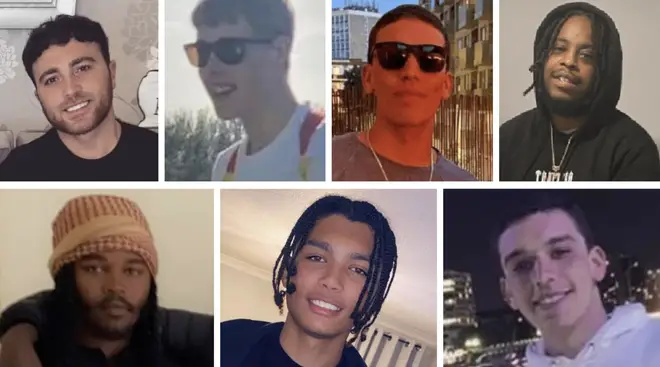
Lewis Goodall 10am - 12pm
2 December 2022, 13:07 | Updated: 4 December 2022, 11:45

The number of homicides in London in 2022 has reached 100, the Metropolitan Police has told LBC.
The grim toll includes murder and manslaughter cases, and has been reached following a string of violent attacks in recent weeks.
LBC analysis has found 20 per cent of the killings have taken place in the last seven weeks alone, including the tragic cases of 16-year-olds Charlie Bartolo and Kearne Solanke, who were both found stabbed to death in Thamesmead in South East London less than a mile apart on Saturday November 26.
It also includes the victims of a double shooting in Ilford, which saw rappers Saydi Abu Sheikh, 23, and Zakariya Jeilani Mohamed, 32 killed in a suspected gangland hit shortly after midnight on Tuesday, October 25.

Being part of a gang was a 'relief to the pain' this caller felt as a child.
Separately, 27-year-old Lemar Urquhart, son of boxer Dillian Whyte's promoter Dean Whyte, was gunned down in Brixton on 30 October. A Brazilian Deliveroo moped driver Guilherme Messias Da Silva, 23, was also killed during the car chase.
Other recent incidents include the stabbing of Reece Newcombe, 31, on Richmond Bridge on Saturday November 26, and the death of a 21-year-old man who was stabbed in broad daylight on a Marylebone street on Monday November 28.
According to analysis by LBC, a third of victims in 2022 are young men of colour.
At least 32 Black and Asian men in their teenagers or 20’s have been killed in the capital so far this year, according to LBC’s analysis.

Being part of a gang was a 'relief to the pain' this caller felt as a child.
It comes as the Met Commissioner Sir Mark Rowley revealed young black men are 12 times more likely to be murdered in London over the last decade than young white men.
When asked about the "disproportionate" use of police strip search powers on black people, Sir Mark Rowley told the assembly's plenary meeting: "I think there's something about how we look at the crime problems policing is wrestling with.
"I've been really clear that we have some officers in the service who are racist who we need to sort out and we don't get everything right, I've been really candid about that.
"But I think it would be helpful if we also look at how crime falls very unevenly on London.
"I very rarely get questions publicly about why it is that young black men are 12 times more likely to be murdered in London over the last decade than young white men.
"We're always focusing on the police use of powers, and I'm absolutely clear we haven't always got that right, so I'm not trying to be defensive about it, but if we're to tackle the fact that black communities have the lowest trust but also the highest victimisation, we need to be prepared to talk about these issues in the round."
Last year, there had been 124 murders by December. But 14% of them took place in the same seven week period, compared to 20% this year.
London Mayor Sadiq Khan did reveal that teenage homicide numbers in the capital have reduced by 65per cent this year compared with last year.
Answering questions from members of the London Assembly alongside Met chief Sir Mark Rowley, Mr Khan said: "We can't not mention Charlie Bartolo and Kearne Solanke - they're the names of the two 16 year olds who lost their lives this weekend.”
Mr Khan added: "We've seen just from last year to this year a reduction of more than 65 per cent in teenage homicides. We've bucked the national trend.
"If you were speaking with similar forces - the Greater Manchesters, the West Yorkshires, the West Midlands, they've seen nothing like the reductions that we've seen in crime. It's showing we are starting to make progress."
Mr Khan said the reduction in teenage homicides was thanks to the work of London youth groups and Sir Mark Rowley's community policing boost meaning there are greater numbers of officers visible on the streets.
The force also revealed to LBC 89 per cent of homicide cases this year have resulted in a charge, leaving 11 per cent unsolved.